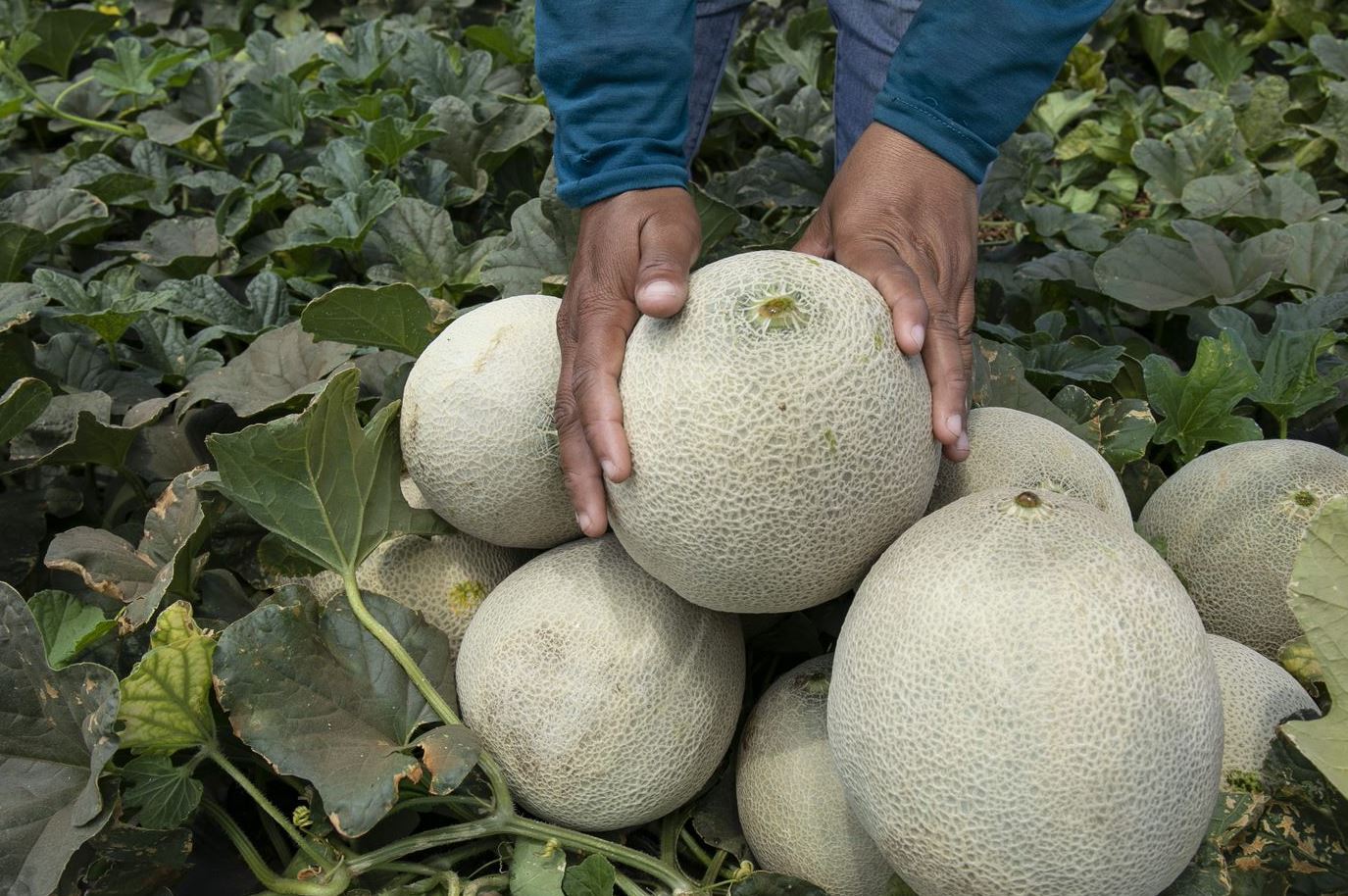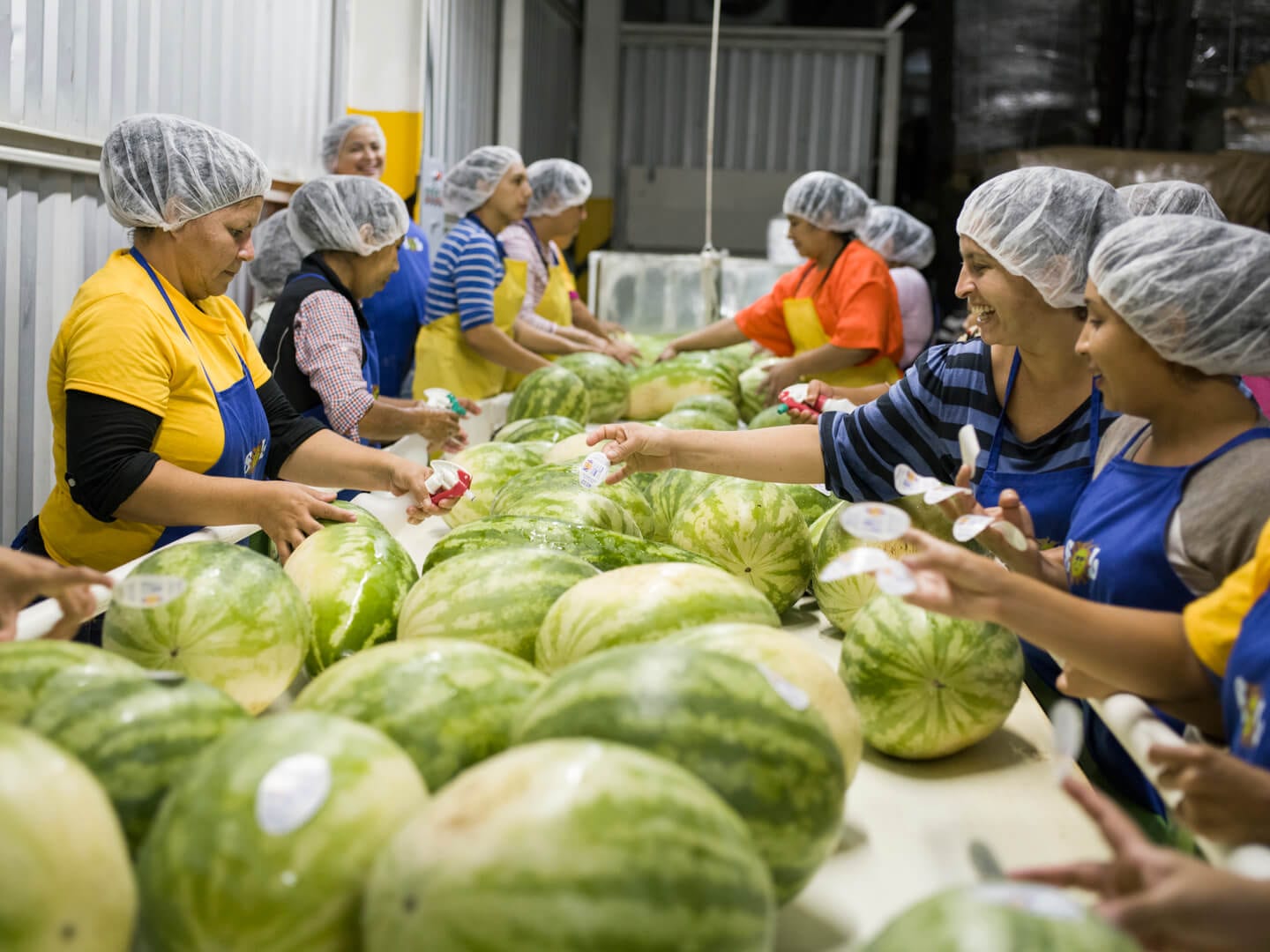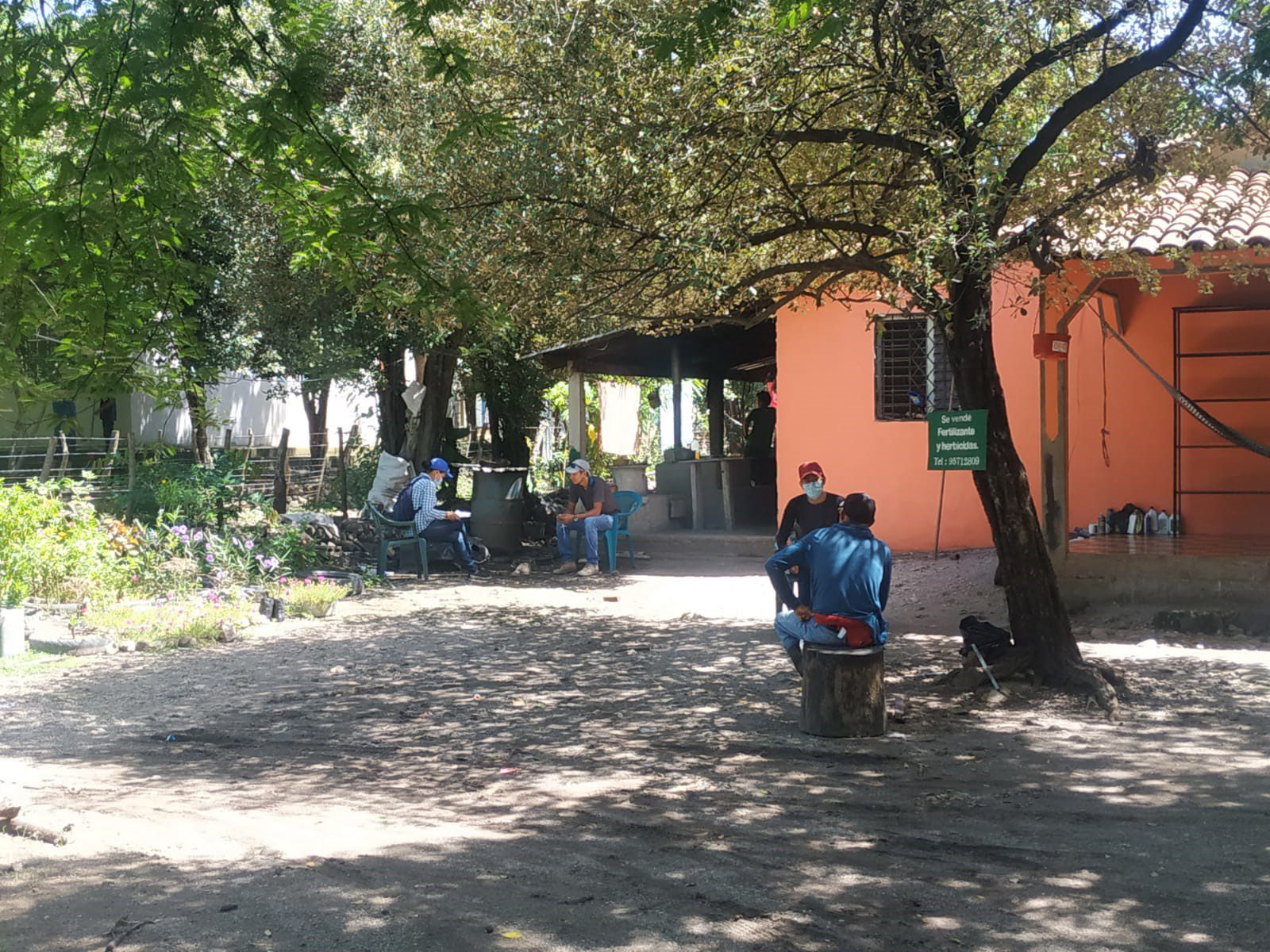Fyffes Progress in Honduras





What operations does Fyffes have in Honduras?
Fyffes completed its purchase of Sol in 2013. This gave Fyffes ownership of Suragroh and Melon Export farms in the municipality of Choluteca, employing between 500 employees during the off-season and up to 10,500 seasonal workers during the season that runs from end-November to mid-May each year. Fyffes also has a watermelon business called Soleado, located near the municipality of Ojo de Agua, El Paraiso, which employs just under 60 permanent employees and 1,577 seasonal workers. Fyffes Honduran (and Guatemalan) melons and watermelons are imported into North America during the winter months.
What certifications have Fyffes melon farms Melon Export and Suragroh received?
Melon Export and Suragroh have received PrimusGFS field and packhouse certification for food safety, and C-TPAT for security risk assessment. All Fyffes melon farms in Honduras are now GlobalG.A.P IFA certified (GGN 4063651579468, GGN 4063651579550, GGN 4063651579444). They have also undergone Sedex Members Ethical Trade Audits (SMETA) on health and safety, employment, social and environmental standards, with regular internal and independent external audits. The most recent internal audit was conducted on the week of 30th of January 2023, and the most recent annual independent APSCA-accredited audit took place the week of 13th of March 2023. Additionally, Suragroh and Melon Export comply with a variety of customer-mandated standards.
In November 2022 the Honduran Foundation for Socially Responsible Business (FUNDAHRSE) awarded [https://www.fyffes.com/news/fyffes-honduran-melon-business-receives-award-for-social-responsibility/] Fyffes melon business Sol Group the coveted FUNDAHRSE Socially Responsible Company Seal for the years 2022-2023 after obtaining an average of 96% in seven thematic indicators for corporate social responsibility.
How has Fyffes improved conditions at its melon farms?
Fyffes appointed new management of its Honduran and Guatemalan melon farms in September 2021. The new leadership has transformed Fyffes business, improving working conditions, health and safety, investment in the local community and providing employment opportunities during the off-season summer months.
WAGES AND BENEFITS
Does Fyffes pay workers sufficiently?
Fyffes workers at the lowest salary level are paid at least the minimum wage with most of our workers being paid above the minimum wage and the Honduran government has set the minimum wage above the living wage. Workers earn more depending on the required skill level and responsibility of the role; productivity and performance are also factored in.
Does Fyffes pay social security for temporary workers?
The Honduran labour legislation was amended in July 2015 to require companies to deduct social security from their temporary workers; however, the government of Honduras has yet to establish a mechanism to implement those reforms. Once the government of Honduras defines this mechanism, Fyffes will ensure it makes the necessary deductions. In the meantime, Fyffes does not want to short-change its workers, so we are not deducting social security from pay. During bargaining with the unions in 2019, Fyffes agreed to pay temporary workers a seasonal bonus at the end of each season. During the second Collective Bargaining negotiations, Fyffes local management agreed to maintain the seasonal bonus for seasonal workers. This CBA was agreed in May 2022 and will apply for three years. All seasonal workers were offered at a minimum a 2.5% increase above the minimum wage, as negotiated between the Base Unions and local management.
During the off-season, how does Fyffes continue to ensure the wellbeing of its temporary workers?
Fyffes provides medical clinics at the farms for all workers (permanent and temporary) year-round. We also provide free medical check-ups, vaccinations, and medicine to all elementary school students, as well as children not attending the school in the communities around the farms, regardless of whether they are employees’ children or not.
To provide economic opportunities for Honduran seasonal workers during the summer months, Fyffes and its subsidiary SOL Group developed a Corn Production and Food Security Project in collaboration with Bayer Food Chain Partnership. The programme involves providing farmer communities access to hybrid seeds, professional seed treatment, farmer trainings on good agricultural practices, agronomic advice and crop protection products including solutions to improve plant resilience and innovative spray technologies, like drones, which resulted in the production of 4,500 quintals of corn for the benefit of the local community during the 2022 off-season.
Sol Group provided 185 acres of land from its farm Suragroh in Choluteca, as well as agricultural supplies, fertilizer, personal protective equipment, and technical assistance to facilitate communal production of corn during the melon off-season, benefitting more than 200 local families.
The project also included ‘Field School’ training sessions for the participants to support them throughout the entire crop cycle, teaching good agricultural practices, safety and hygiene, and the use and management of agrochemical products to improve yield and overall food security. In addition, it supported the local community through the establishment of a rural savings bank to manage community investment funds and develop a business model that will contribute to the food security in the region.
FREEDOM OF ASSOCIATION
Fyffes respects the right of all workers to freedom of association, and we will not attempt to influence decisions that workers – temporary and permanent – make about their rights to freedom of association.
What is freedom of association?
Fyffes understands that freedom of association means our workers are free to join a union of their choosing. The workers are also entitled to organise as part of workers’ committees, and they are also free not to join a union.
What is Fyffes doing to improve workers’ understanding of freedom of association?
All workers are trained on the ETI Base Code, which has nine core elements, one of which is freedom of association. However, in a 2019 audit, workers were not routinely able to explain what freedom of association was. As a result, in October 2019 Fyffes worked with FUNDAHRSE, an NGO with expertise in this field, to train all our workers on freedom of association.
In 2023, all Fyffes management globally is completing mandatory training on Freedom of Association. As of September 2023 the completion rate is 77%.
Are there unions at Fyffes Honduran operations?
There are two unions on our farms in Choluteca: SITRASURAGROH and SITRAMELEXA at the Suragroh and Melon Export farms respectively. These unions were granted legal authority by the Honduran Ministry of Labour in 2018 to represent workers on our farms. These unions held elections for their Boards of Directors in April 2022 during their general assemblies and their members elected boards of directors that are compliant with all Articles of the Honduran labour code, including Article 511, which stipulates they must not be ‘personas de confianza’ as well as compliant with ILO Conventions. They concluded CBA negotiations and the CBAs came into force during the 2022/2023 season. Over 90% of employees have chosen to be represented by either of these two unions depending on whether they are employed by Melon Export or Suragraoh.
These unions are affiliated with FESITRANH, a federal union organisation.
The President of Sitramelexa board of directors is Liliana Lopez and the President of Sitrasuragroh board of directors is Javier Guillen.
What is the history of the labour rights issue with Fyffes melon farms?
As far back as 2012, a Honduran trade union called Sindicato de Trabajadores de la Agroindustria y Similares (STAS) started to organise on Fyffes owned melon farms in the region of Choluteca. STAS had no presence in the southern part of Honduras and sought to build its membership. Local management at the time and the majority of permanent employees resisted this organisation by STAS. It is estimated no more than 200 people wished to be affiliated with STAS.
In 2018 permanent employees formed two base unions and 100% of the employees joined these two unions. In Honduras, you can only have one collective bargaining agreement (CBA) for each legal entity and so, there cannot be more than one union either. These base unions were endorsed by the Ministry of Labour in October 2018.
In December 2018, Fairtrade USA decertified the two melon farms, coming under pressure from international Non-Governmental Organisations (NGOs) to do so. At the same time NGOs targeted customers of the Honduran melon farms.
In March 2019, Fyffes was expelled from the Ethical Training Initiative, for the same reason. Fyffes was a founder member of the ETI.
The result of the decertification, the campaign against customers and the expulsion from ETI was that Fyffes was forced to scale back its Honduran operations, planting less hectares and employing less seasonal workers. In addition, workers lost the Fairtrade premium.
What is Fyffes current status with STAS?
In Honduras, it is the Ministry of Labour that determines which unions have legal recognition, and they have determined that STAS is not the legitimate union at our two melon operations. The unions at these operations are SITRAMELEXA and SITRASURAGROH.
Since the 19/20 season, Fyffes has hired STAS-affiliated workers at our melon farms without fail. During the 2022/2023 season there were 43 STAS affiliates.
Fyffes met with STAS in San Pedro Sula in December 2019 and had over 34 meetings trying to find a mechanism through which STAS affiliates could be legally represented by STAS. To date there is no agreement in place between STAS and Fyffes.
During May 2022 STAS coordinated signatures from multiple international NGOs on a letter to Fairtrade USA, asking that organisation not to re-certify Fyffes melon farms.
In July 2022 Fyffes ceased negotiations with STAS at the request of its employees.
Petition signed asking Fyffes to sign with STAS
In March 2023, STAS supported by INGOs collected the signatures of 1,049 people who they claimed were workers asking to be represented by STAS and for Fyffes and STAS to sign an Agreement. The signatures were provided to Fyffes so that we could cross-reference them against the list of workers:
- 96 signatures were from active employees
- 359 were from a community we no longer hire many workers from (due to scaling back the business)
- 609 names had never worked for Fyffes (since payroll records began in 2013)
- 16 signed the document twice
- 52 signed without ID
- 14 signed document with incomplete ID
The 96 employees who signed the document were told by STAS that they would be able to grant them permanent work and social security. Permanent work is only possible for employees who have higher level qualifications. The issue regarding social security is outlined above.
Protest against unsafe conditions, call for labour rights
In March 2023 STAS, supported by INGOs organised a protest outside Fyffes farms with 200 people. Not one protester was a Sol/Fyffes employee, they were bussed in from far away and paid US$6 to take part in the protest.
How does Fyffes select appropriate workers to apply pesticides?
There are two types of workers within Fyffes melon farms: the majority of our workers who have little or no exposure to chemicals and the smaller number of workers who have a role in applying pesticides. Fyffes selects workers who are over 18 years old and who have passed their general medical examination, including the necessary blood tests done for cholinesterase. Blood tests are taken regularly to monitor cholinesterase levels.
What protective equipment is provided for workers and how are these maintained?
Fyffes provides and ensures the use of appropriate protective equipment (gloves, overalls, boots, masks with appropriate filters, goggles) during storage, handling and application, as per product labels. Applicators must shower on site before leaving work, and their overalls are washed and dried by trained personnel on site.
How are workers educated on the correct application method?
To prioritise personal safety, workers are trained in wind speed, direction, temperature and closeness to field borders, roads and field margins.
How are workers in the pack-house protected from chemical exposure?
In the pack-house, workers close to the melon reception water tanks (which contain chlorine) are provided with respirator masks and are rotated often to reduce the possibility of eye and nose irritation. Washing staff also have their cholinesterase levels monitored.
Why do workers wear scarves over their faces while working in the fields?
This is for sun protection and, in some cases, to protect against the natural powder that the cantaloupe skin gives off, which can be itchy but is not toxic.
What practices does Fyffes follow to prevent and limit the exposure of other workers to chemicals?
Pesticides are normally applied at night or late afternoon when no one is around or in nearby fields. When workers are eating outside and not in the canteen provided, we ensure this is not at the same time or close by pesticide application.
Detailed incident reports are kept on the rare and unfortunate occasion when a worker is exposed to chemicals by mistake.
Bus drop-off points are designated and known, normally near shelters, and bus drivers are told the night before where to drop off workers in the mornings.
Pesticide selection, application and management adhere to international good agricultural practice standards ( Primus GFS) and are audited both internally and externally.
COMMUNITY CONTRIBUTION
What are the main community needs in the areas surrounding the farms?
In September 2021 Fyffes undertook an independent community needs assessment in 14 communities surrounding our melon farms in Choluteca. The interviewers, who are environmental and social experts, conducted 900 in-depth, anonymous interviews to find out more about the needs of the community as well as the impact that the melon farms have on them, both positive and negative.
The biggest issue of concern for community members is access to work and economic opportunity. The areas for improvement included medical infrastructure, road condition and safety, housing, access to nutritious food, waste collection, and affordability of education. 50% of respondents also said that extreme weather events were negatively impacting their prospects.
48% of the respondents had worked at Fyffes farms during the past season, with 57% having worked at the farms in the past years. However, the interviews exposed a general lack of understanding about Fyffes hiring practices. Fyffes has changed its hiring practices, eliminating the ‘caporale’ system of recruiting workers via other workers and instead all hiring is conducted by human resources during recruitment fairs.
The results of the community needs assessment have informed our community strategy, which focuses on the following broad areas: access to nutrition, primary education, gender empowerment, and climate change resilience.
More details can be found here.
Medical outreach
Sol provides four medical clinics, five doctors, four nurses and five ambulances in the regions of Choluteca and El Paraiso, where their farms are located, to ensure that employees, their families and the local community can have access to otherwise inadequate and hard to reach healthcare. During the summer off-season however, community members struggle to access these medical services. To solve this problem, Sol has organized Community Medical Brigades to reach 15 communities surrounding its cantaloupe, watermelon, and honeydew melon farms. Last off-season they treated or provided medical outreach to 750 people.
How is Fyffes tackling the issue of gender inequality in Honduras?
According to the United Nations, Honduras is ranked as one of the worst performers in gender inequality. Fyffes employs many women workers, so this is a priority.
Working with Business for Social Responsibility, Fyffes has adapted a digital gender equality training tool called HERessentials for Latin American audiences. The tool includes both a worker and manager version. 100% of Fyffes Latin American operations have started this training and we will ensure 100% of workers, men and women, receive this training.
Education
Our Honduran operations implemented a ‘Safe Return to Class’ project benefiting more than 6,600 children in 30 education centres with a community project proving sanitary and hygiene suppliers, PPE and biosafety equipment to staff, teachers and students with the aim to prevent the spread of COVID-19.
The company also brought in a nutrition pilot programme benefitting 138 families. This project involved delivering 13,151 nutritionally balanced lunches to children from the Ramon Villeda Morales and Manuel Milciades Mendieta schools from the communities of La Permuta and Tablones Abajo, both located in the municipality of Santa Ana de Yusguare, Choluteca. The lunches were prepared by parents and facilitators from the Food Bank of Honduras, who took part in 16 training sessions and eight workshops on nutrition and promoting healthy eating habits. So far, Fyffes has donated 1,200 melons to local families.




